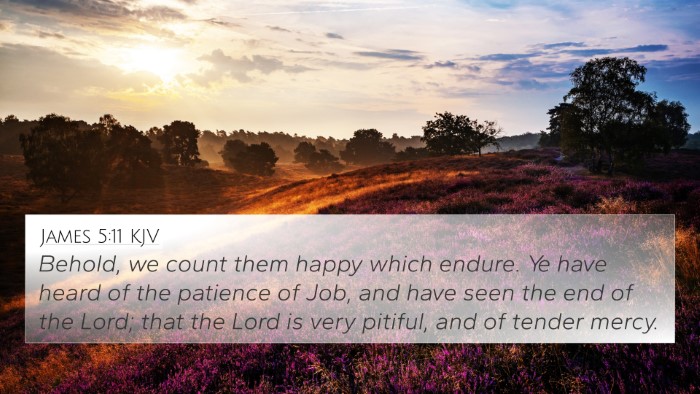Old Testament
Genesis Exodus Leviticus Numbers Deuteronomy Joshua Judges Ruth 1 Samuel 2 Samuel 1 Kings 2 Kings 1 Chronicles 2 Chronicles Ezra Nehemiah Esther Job Psalms Proverbs Ecclesiastes Song of Solomon Isaiah Jeremiah Lamentations Ezekiel Daniel Hosea Joel Amos Obadiah Jonah Micah Nahum Habakkuk Zephaniah Haggai Zechariah MalachiJob 5:17 Similar Verses
Job 5:17 Cross References
Behold, happy is the man whom God correcteth: therefore despise not thou the chastening of the Almighty:
Uncover the Rich Themes and Topics of This Bible Verse
Listed below are the Bible themes associated with Job 5:17. We invite you to explore each theme to gain deeper insights into the Scriptures.
Job 5:17 Cross Reference Verses
This section features a detailed cross-reference designed to enrich your understanding of the Scriptures. Below, you will find carefully selected verses that echo the themes and teachings related to Job 5:17 KJV. Click on any image to explore detailed analyses of related Bible verses and uncover deeper theological insights.

James 1:12 (KJV) »
Blessed is the man that endureth temptation: for when he is tried, he shall receive the crown of life, which the Lord hath promised to them that love him.

Psalms 94:12 (KJV) »
Blessed is the man whom thou chastenest, O LORD, and teachest him out of thy law;

Proverbs 3:11 (KJV) »
My son, despise not the chastening of the LORD; neither be weary of his correction:

Hebrews 12:5 (KJV) »
And ye have forgotten the exhortation which speaketh unto you as unto children, My son, despise not thou the chastening of the Lord, nor faint when thou art rebuked of him:

James 5:11 (KJV) »
Behold, we count them happy which endure. Ye have heard of the patience of Job, and have seen the end of the Lord; that the Lord is very pitiful, and of tender mercy.

Jeremiah 31:18 (KJV) »
I have surely heard Ephraim bemoaning himself thus; Thou hast chastised me, and I was chastised, as a bullock unaccustomed to the yoke: turn thou me, and I shall be turned; for thou art the LORD my God.
Job 5:17 Verse Analysis and Similar Verses
Understanding Job 5:17
Job 5:17 states, "Behold, happy is the man whom God correcteth: therefore despise not thou the chastening of the Almighty." This verse encapsulates a profound theological principle about suffering, correction, and divine benevolence.
Summary of Meaning
The verse emphasizes the blessings associated with God's correction. While suffering is often seen as a negative experience, it is portrayed here as a sign of God's love and engagement with the believer. This reflects a central theme in biblical literature that links divine discipline to personal happiness and spiritual growth.
Insights from Commentaries
- Matthew Henry: Henry elucidates that God's chastening is not solely punitive but rather a means to refine and purify His people. He contrasts worldly views of happiness with divine perspectives on suffering, suggesting that true happiness comes from accepting and understanding God’s reasons for correction.
- Albert Barnes: Barnes highlights the idea that suffering can produce a deeper relationship with God. He argues that despising God's chastening can lead to a lack of spiritual insight and growth, thus a reminder that acceptance of divine instruction leads to peace and joy.
- Adam Clarke: Clarke discusses the importance of viewing God's corrections as an opportunity for spiritual awakening and transformation. He emphasizes that true happiness derives from being in right fellowship with God, which often requires undergoing trials and tribulations.
Thematic Cross-References
Job 5:17 serves as a touchstone for several biblical themes. Here are some related cross-references that enhance our understanding:
- Proverbs 3:11-12: "My son, despise not the chastening of the Lord; neither be weary of his correction." This verse clearly aligns with Job 5:17, reinforcing the notion that chastening is part of a loving relationship with God.
- Hebrews 12:5-6: "And ye have forgotten the exhortation which speaketh unto you as unto children, My son, despise not thou the chastening of the Lord." This New Testament verse ties closely to Job's experience, affirming the consistency of God's corrective love across scripture.
- Psalm 94:12: "Blessed is the man whom thou chastenest, O Lord, and teachest him out of thy law." This reinforces the blessing of divine discipline, echoing the happy state of those who accept God's guidance.
- Revelation 3:19: "As many as I love, I rebuke and chasten: be zealous therefore, and repent." Here, the connection between love, correction, and repentance is clearly made, similar to the teachings in Job.
- James 1:2-4: "My brethren, count it all joy when ye fall into divers temptations." This verse speaks to the idea of joy in trials, aligning with Job's perspective on suffering's role in producing happiness.
- Romans 5:3-5: "And not only so, but we glory in tribulations also: knowing that tribulation worketh patience." This teaches the redemptive quality of suffering, emphasizing a connection between trials and spiritual maturity.
- 2 Corinthians 1:3-4: "Blessed be God, even the Father of our Lord Jesus Christ, the Father of mercies, and the God of all comfort." Here, the comfort that follows suffering is acknowledged, linking back to the design of divine discipline.
Applying the Insights
This high regard for God's corrective processes encourages believers to welcome challenges as opportunities for growth. As one engages in Bible cross-reference study, they uncover the intricate connections between different passages that illuminate this profound reality. In utilizing cross-reference tools and resources, like a Bible concordance or Bible cross-reference guide, readers may find consistent themes that bolster understanding.
Conclusion
Job 5:17 is a potent reminder of the necessity and benefit of divine correction. The insights provided by commentaries like those of Matthew Henry, Albert Barnes, and Adam Clarke emphasize that God's love often comes in the form of challenges meant to redirect and strengthen believers. When we embrace such teachings, we recognize that thematic Bible verse connections reveal the harmony within scripture regarding the nature of suffering, correction, and the ultimate pursuit of happiness in God.



